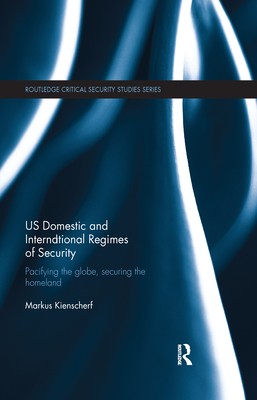
- We will send in 10–14 business days.
- Author: Markus Kienscherf
- Publisher: Routledge
- ISBN-10: 1138108790
- ISBN-13: 9781138108790
- Format: 15.6 x 23.4 x 1.1 cm, softcover
- Language: English
- SAVE -10% with code: EXTRA
Us Domestic and International Regimes of Security (e-book) (used book) | bookbook.eu
Reviews
Description
This book maps the increasing convergence of US domestic and international security regimes, analyzing the trend towards global pacification in the name of 'security'.
The dream of liberal world peace after the Cold War is on the verge of collapsing into permanent global pacification - not only in the global south but also in pockets of the 'Third World' within the territory of Western states. In this volume, the author explores the ways in which regimes of security have been extended into increasingly large aspects of social life and shows that their expansion has been driven by a constant broadening of the notion of 'war'.
Filling a gap in the literature, the book demonstrates how US security agencies have sought to develop indeterminate security capabilities aimed at distinguishing between legitimate and illegitimate flows of people and resources. This analysis of regimes of security is tied to a more general discussion about the persistence, or even multiplication, of illiberal forms of power within liberal governmentality.
This book will be of much interest to students of security studies, war and conflict studies and international relations in general.
EXTRA 10 % discount with code: EXTRA
The promotion ends in 6d.14:37:25
The discount code is valid when purchasing from 10 €. Discounts do not stack.
- Author: Markus Kienscherf
- Publisher: Routledge
- ISBN-10: 1138108790
- ISBN-13: 9781138108790
- Format: 15.6 x 23.4 x 1.1 cm, softcover
- Language: English English
This book maps the increasing convergence of US domestic and international security regimes, analyzing the trend towards global pacification in the name of 'security'.
The dream of liberal world peace after the Cold War is on the verge of collapsing into permanent global pacification - not only in the global south but also in pockets of the 'Third World' within the territory of Western states. In this volume, the author explores the ways in which regimes of security have been extended into increasingly large aspects of social life and shows that their expansion has been driven by a constant broadening of the notion of 'war'.
Filling a gap in the literature, the book demonstrates how US security agencies have sought to develop indeterminate security capabilities aimed at distinguishing between legitimate and illegitimate flows of people and resources. This analysis of regimes of security is tied to a more general discussion about the persistence, or even multiplication, of illiberal forms of power within liberal governmentality.
This book will be of much interest to students of security studies, war and conflict studies and international relations in general.


Reviews